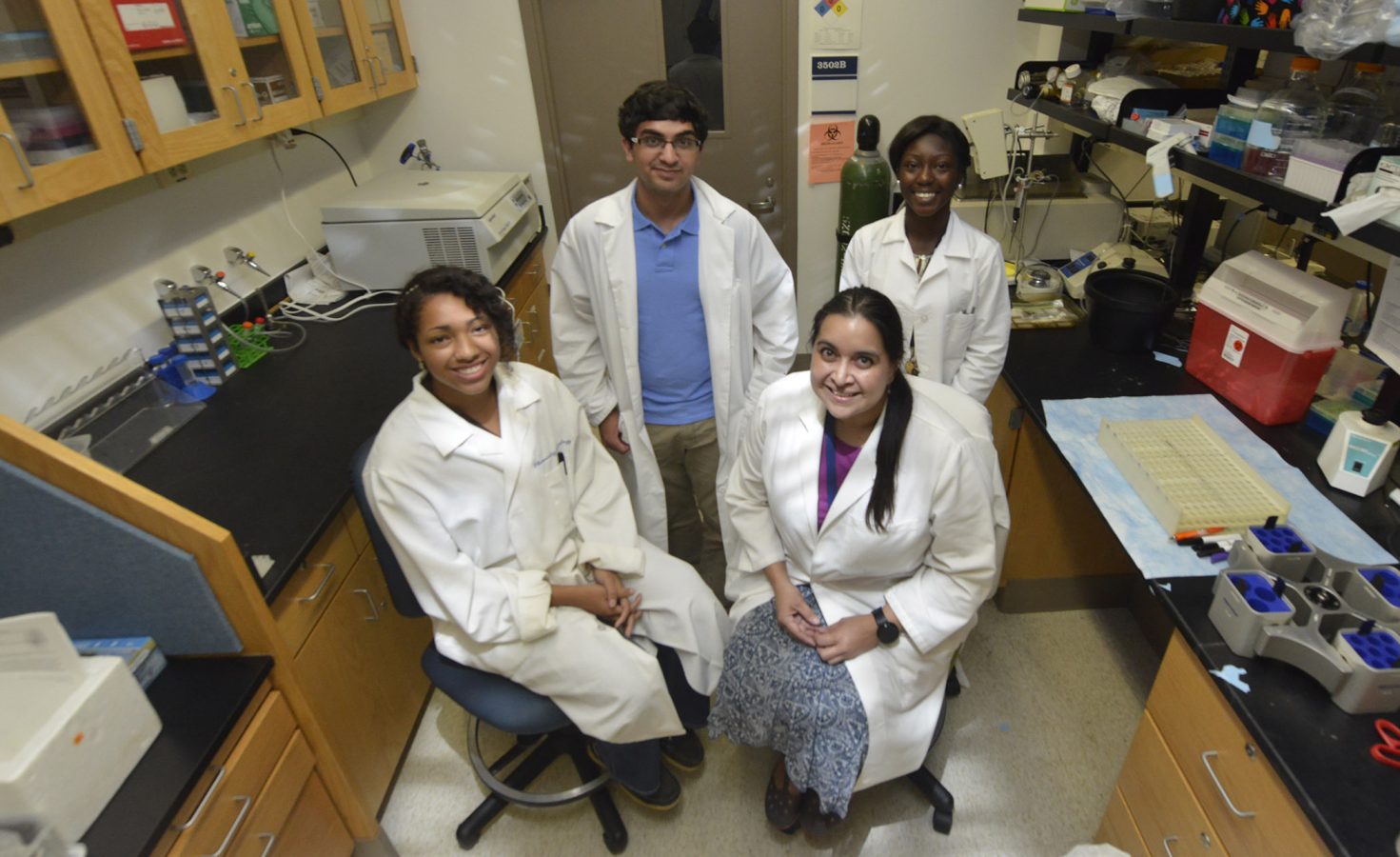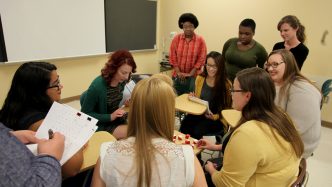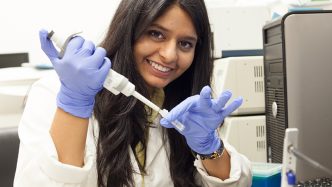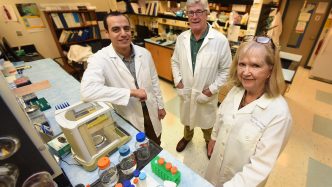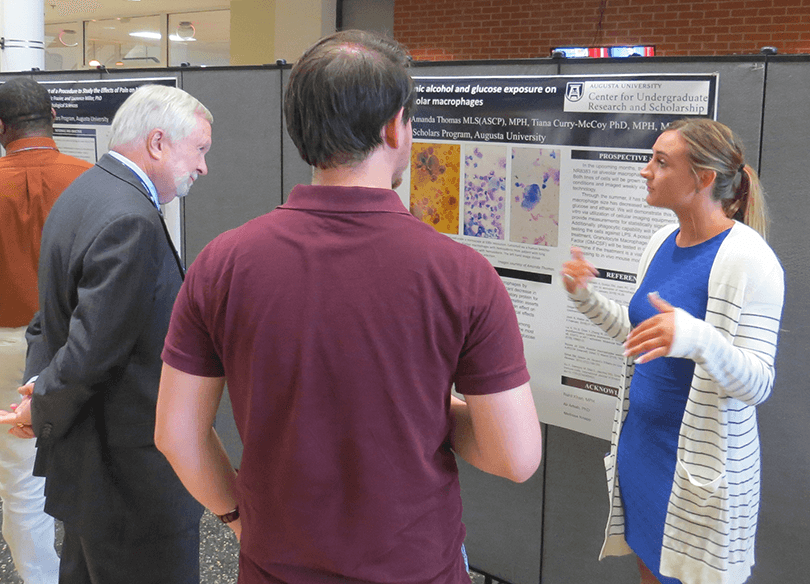When Dr. Caterina Hernandez, Assistant Professor in Pharmacology and Toxicology, returned to GRU after over a decade away, she found a lot had changed, not only with the school, but with herself as well.
She’d only been living in Galveston, Texas, for about a month when Hurricane Ike devastated the Gulf Coast, and though she was new to the area, she rolled up her sleeves with the rest of her neighbors and helped out in the aftermath. In her case, helping out meant lending a hand at a local K-8 school with science fair projects.
“Nobody wanted to go there, and their science teacher was new to teaching middle school science and setting up hypothesis-driven projects,” she said. “So I went over there and started volunteering and said, ‘Okay, I really like this teaching thing.’”
Though she’d worked with graduate students and postdocs before, this was different. This was rewarding at an entirely different level.
“It was just the best experience,” she said. “I ended up falling in love with mentoring and with the whole population over there.”
While she eventually moved away, that love of mentoring stayed with her, following her all the way back to GRU, where she is currently introducing undergraduate research students to her lab as part of the Center for Undergraduate Research and Scholarship (CURS) Summer Scholars program.
“I had a very difficult time coming up,” she said. “I didn’t have anyone to give me an edge or give me an opportunity, so I always said that once I got up here, I would help somebody who didn’t have the means or the edge to get in. When I saw this CURS opportunity, I was like – oh, I’m going to write for that and see if I can get three undergraduates.”
The CURS Summer Scholars program, which is sponsored by the Office of the Provost, Dr. Carol Rychly, Vice President for Academic and Faculty Affairs, and Dr. Michael Diamond, Senior Vice President for Research, introduces undergraduates to research through a special summer program. For a small stipend, select students agree to work 20 hours per week at the faculty member’s discretion.
This summer, 13 research programs were chosen, each staffed with three undergraduates, though Hernandez added a fourth student through the Student Training and Research program (STAR), which provides biomedical research experience for undergraduate students who plan to pursue a graduate education in biomedical sciences.
Hernandez, who admits to being intimidated by her first lab opportunity, is committed to smoothing the way for her students.
“I worked for a drug company – it was just blind luck somebody got me in there – and I was terrified, because all the other students with me went to magnet schools and had an edge,” she said. “I was in fear, and I would go home every night and massively study. It just always stressed me out.”
She remembers being afraid to ask questions because she didn’t want people to think she was stupid.
“People are intrinsically nice, but I just didn’t know that at the time,” she said. “I see that insecurity with my students now, so I reassure them that any question is fine.”
While she expects mistakes, she insists the students tell her when they make them. When they do, if it’s a mistake she can’t fix or hasn’t done herself before, she gives them a free lunch award.
That’s the thing about science, she said. Everyone makes mistakes, and once you realize that, the whole thing becomes less intimidating.
Although supportive of undergraduate research, she did have to sell her boss on the idea of taking three unseasoned undergraduates into the lab for the summer. She also had to simplify the design and methods of the research project, which is looking at the effects of organophosphates on brain structure, to ensure its completion during the six-week period.
To do that, she fell back on lessons she had learned from a project she worked on in Alabama, where she went from having knowledgeable graduate students to green work-study students who just wanted to take the money and go. For that project, she developed a color-coded strategy, and while this summer’s rising sophomores don’t need quite that much hand holding, they’ve proved challenging in their own way.
Their enthusiasm, however, has been encouraging.
One student, for example, wanted to be part of the program so bad, she dropped one of her classes to do it. Given the fact that she’s taking a full load over the summer, that was a considerable commitment.
“I was like – okay, I’ve got to take her now,” Hernandez said with a smile.
Dejah Johnson, a track athlete who is planning on a career as a physical therapist, was inspired to seek out research opportunities after a high school summer camp.
“I talked to our director of research, and she told me the different opportunities at the school. But at the time, all of them had already been taken, so I was waiting for next year,” she said. “But then I heard about this opportunity, so I emailed Dr. Hernandez and got the opportunity.”
Johnson, who said she had never been to the Health Sciences Campus other than to work out at the gym or to meet friends, is precisely the kind of student Hernandez is looking to help.
“And at that age, I didn’t have the confidence to come bug people, so I got really lucky to get this award and be able to choose from a bunch of students who really needed this opportunity,” she said. “I really wanted to do this. It was a significant part of my life in Texas, and I had to figure out a way to do it here.”
The fact that it’s helping build a bridge between the two campuses just makes it all that much better.
 Augusta University
Augusta University
